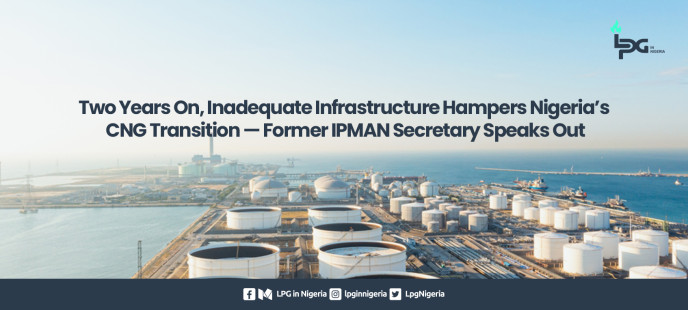- 2405
- 0
Sharing Ideas and Updates on LPG in Nigeria and related information to enable effective collaboration within the LPG Value Chain
Two Years On, Inadequate Infrastructure Hampers Nigeria’s CNG Transition — Former IPMAN Secretary Speaks Out

Two years after the Presidential Compressed Natural Gas (CNG) Initiative was launched, concerns are growing over Nigeria’s ability to effectively implement the project due to a lack of supporting infrastructure. This sentiment was recently echoed by Mr. Mike Osatuyi, former National Secretary of the Independent Petroleum Marketers Association of Nigeria (IPMAN), who faulted the Federal Government for failing to match policy enthusiasm with practical groundwork.
Osatuyi made his comments amid growing complaints about long queues at CNG refueling stations in Lagos and Abuja, which he described as a glaring symptom of infrastructural gaps stalling Nigeria’s clean energy transition.
Commending the Vision, Questioning the Execution
While commending President Bola Tinubu’s patriotic drive to introduce CNG as a cleaner, more affordable fuel source early in his administration, Osatuyi lamented the missed opportunities of the past.
“If this initiative had started 20 years ago, Nigeria could have cut petrol consumption by 50% by now,” he said, noting that the country’s transition to alternative fuels has been too slow to address the economic and environmental urgency of the times.
He acknowledged the strategic decisions made by the administration—such as the appointment of a Minister of Gas and the establishment of the Presidential Initiative on CNG (Pi-CNG), chaired by Zacch Adedeji—but argued that these actions have yet to translate into visible, on-the-ground progress.
Long Queues and Limited Access
Despite plans to deploy 200,000 new CNG-powered buses and tricycles nationwide, Osatuyi stressed that the infrastructure—especially conversion centers and refueling stations—remains far below what is needed.
“Vehicles often spend hours—and trucks, days—at CNG filling stations due to inadequate service capacity,” he said, citing specific bottlenecks at Zuba-Kubwa Road and Airport Road in Abuja, the Mountain of Fire area in Ibafon, and the Ibadan Tollgate.
He likened the current situation to Nigeria’s past fuel scarcity crises, warning that poor and uncoordinated implementation is turning a noble initiative into a “national embarrassment.”
A Call for Practical, Inclusive Action
Osatuyi urged the Pi-CNG Committee to broaden consultations and involve stakeholders from across the oil and gas value chain. “This committee cannot assume a monopoly of knowledge,” he said, stressing the importance of collaboration to ensure the success of the initiative.
He further advocated for the retrofitting of existing IPMAN filling stations to accommodate both CNG and traditional fuels—rather than investing heavily in building entirely new CNG-only outlets.
“This hybrid model would accelerate infrastructure rollout and mirror successful global examples from countries like China, India, Iran, and Pakistan,” he noted.
A Way Forward
To realise the full potential of the Presidential CNG Initiative, Osatuyi emphasized the need for coordinated policy, robust infrastructure development, and strategic investment planning. He also highlighted the importance of public education to increase consumer awareness and drive adoption.
Without urgent intervention, he warned, Nigeria risks squandering yet another opportunity to reduce fuel dependence, cut transportation costs, and improve environmental sustainability.
In the wake of global energy shifts, Nigeria’s CNG initiative represents a bold vision—but its success depends on bridging the gap between policy and practice. As queues grow and public frustration mounts, stakeholders are calling for faster, smarter, and more inclusive action to steer the country toward a cleaner, more resilient energy future.
Source: Independent.ng
















0 Comment.